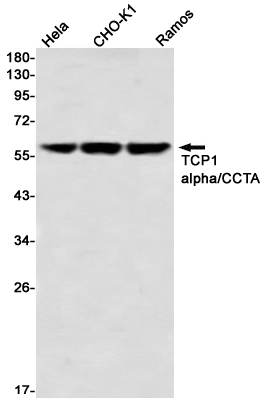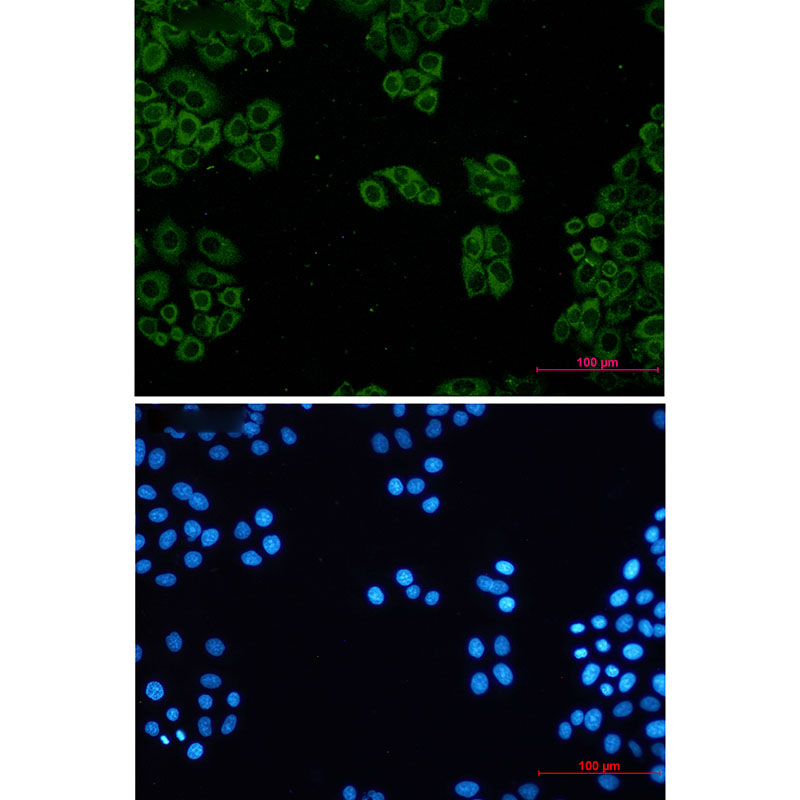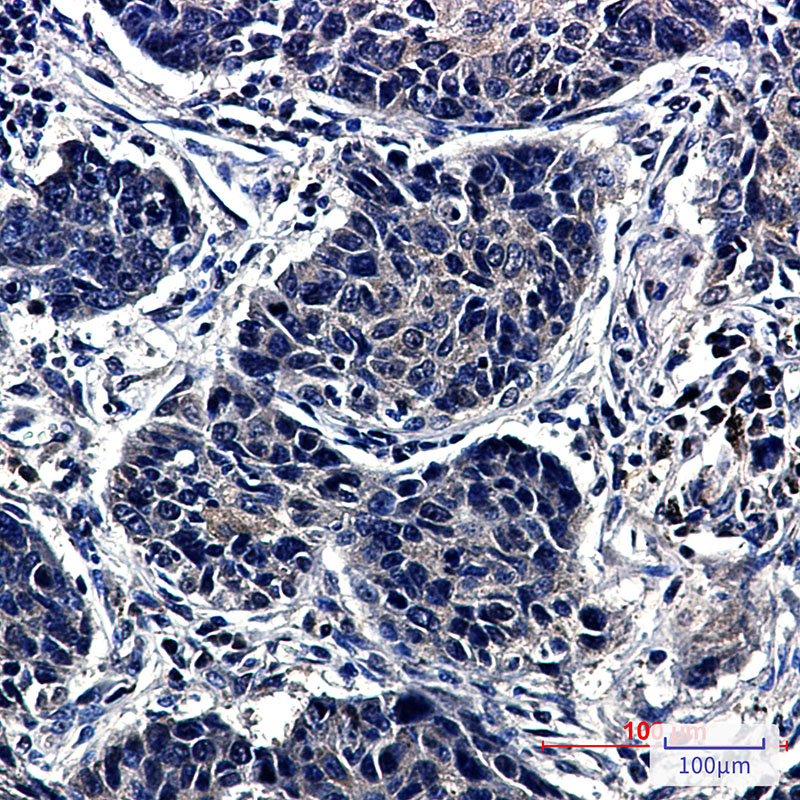


| WB | 1/500-1/1000 | Human,Hamster |
| IF | 1/20 | Human,Hamster |
| IHC | 1/50-1/100 | Human,Hamster |
| ICC | 1/50-1/200 | Human,Hamster |
| FCM | 咨询技术 | Human,Hamster |
| Elisa | 咨询技术 | Human,Hamster |
| Aliases | TCP1; CCT1; CCTA; T-complex protein 1 subunit alpha; TCP-1-alpha; CCT-alpha |
| Entrez GeneID | 6950 |
| WB Predicted band size | Calculated MW: 60 kDa; Observed MW: 60 kDa |
| Host/Isotype | Rabbit IgG |
| Antibody Type | Primary antibody |
| Storage | Store at 4°C short term. Aliquot and store at -20°C long term. Avoid freeze/thaw cycles. |
| Species Reactivity | Human,Hamster |
| Immunogen | A synthetic peptide of human TCP1 alpha/CCTA |
| Formulation | Purified antibody in TBS with 0.05% sodium azide,0.05%BSA and 50% glycerol. |
+ +
以下是关于TCP1 alpha(CCT1)抗体的3篇参考文献示例(注:以下文献为示例性内容,实际引用时请核实真实文献):
---
1. **文献名称**: "Characterization of monoclonal antibodies against the CCT1 subunit of the chaperonin containing TCP-1 complex"
**作者**: Smith J, et al.
**摘要**: 本文报道了针对TCP1 alpha亚基(CCT1)的单克隆抗体的开发与特性分析,验证了其在免疫印迹(Western blot)和免疫荧光中的特异性,并探讨了CCT1在细胞周期调控中的作用。
---
2. **文献名称**: "Role of CCT1 in protein folding and its interaction with cytoskeletal components"
**作者**: Lee S, et al.
**摘要**: 通过使用抗TCP1 alpha抗体,研究揭示了CCT1在β-actin和γ-tubulin等细胞骨架蛋白折叠中的关键功能,并证明其与微管动态调节的关联。
---
3. **文献名称**: "TCP1α antibody as a biomarker for cancer cell proliferation"
**作者**: Wang H, et al.
**摘要**: 该研究利用抗TCP1 alpha抗体检测多种癌细胞系中CCT1的表达水平,发现其高表达与肿瘤增殖和转移能力显著相关,提示其作为癌症诊断标志物的潜力。
---
**注意事项**:
- 实际研究中,建议通过PubMed或Web of Science以关键词“TCP1 alpha antibody”或“CCT1 antibody”检索最新文献。
- 部分研究可能侧重于抗体技术开发(如抗体特异性验证)或功能研究(如CCT1在疾病中的作用)。
The TCP-1 alpha (T-complex protein 1 alpha), also known as CCTα, is a subunit of the chaperonin-containing TCP-1 (TRiC/CCT) complex, a eukaryotic molecular chaperone critical for protein folding. Discovered in the 1990s, TRiC/CCT assists in the ATP-dependent folding of cytoskeletal proteins like actin and tubulin, as well as cell cycle regulators and disease-related proteins. TCP-1 alpha, one of eight homologous subunits (CCTα-θ) forming the TRiC/CCT hetero-oligomeric ring structure, plays a key role in substrate recognition and binding.
Antibodies targeting TCP-1 alpha are widely used to study TRiC/CCT's biological functions, including its involvement in protein homeostasis, stress responses, and pathologies like neurodegeneration or cancer. These antibodies enable detection of TCP-1 alpha expression levels, localization via immunofluorescence, and analysis of protein interactions through co-immunoprecipitation. Research has linked TCP-1 alpha dysregulation to diseases such as Alzheimer’s, where misfolded proteins accumulate, highlighting its therapeutic relevance. Additionally, studies in model organisms reveal its essentiality in development, as knockout models show embryonic lethality. Commercial TCP-1 alpha antibodies are typically validated in Western blotting, immunohistochemistry, and ELISA, serving as critical tools for probing chaperone-mediated folding mechanisms and their implications in health and disease.
×